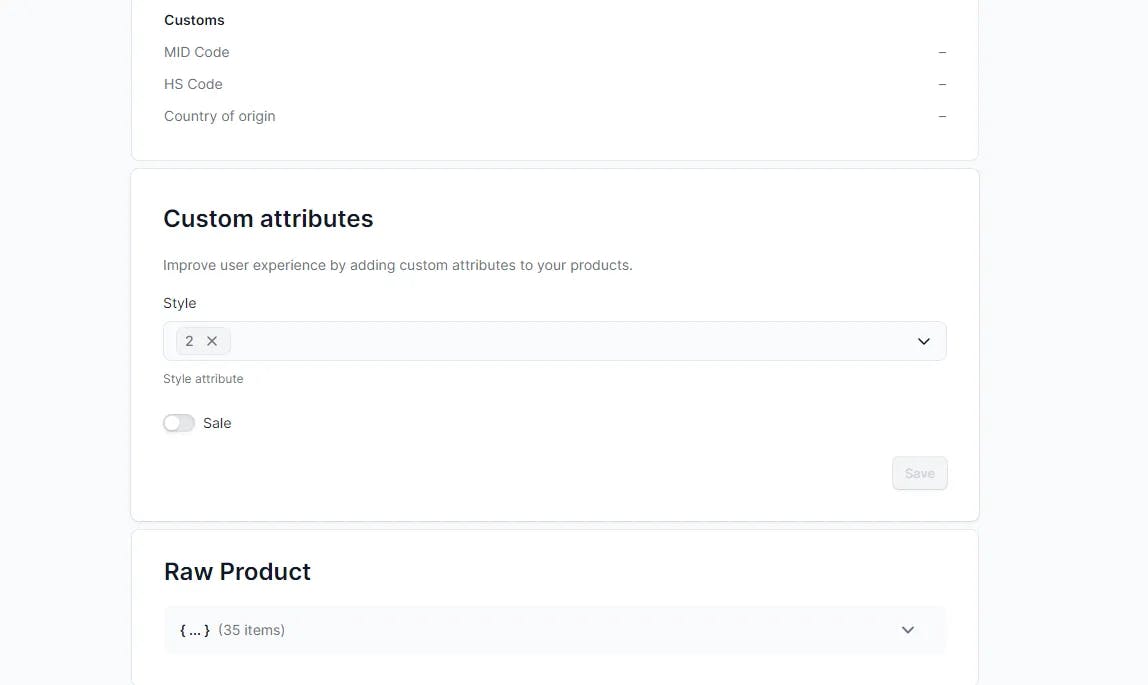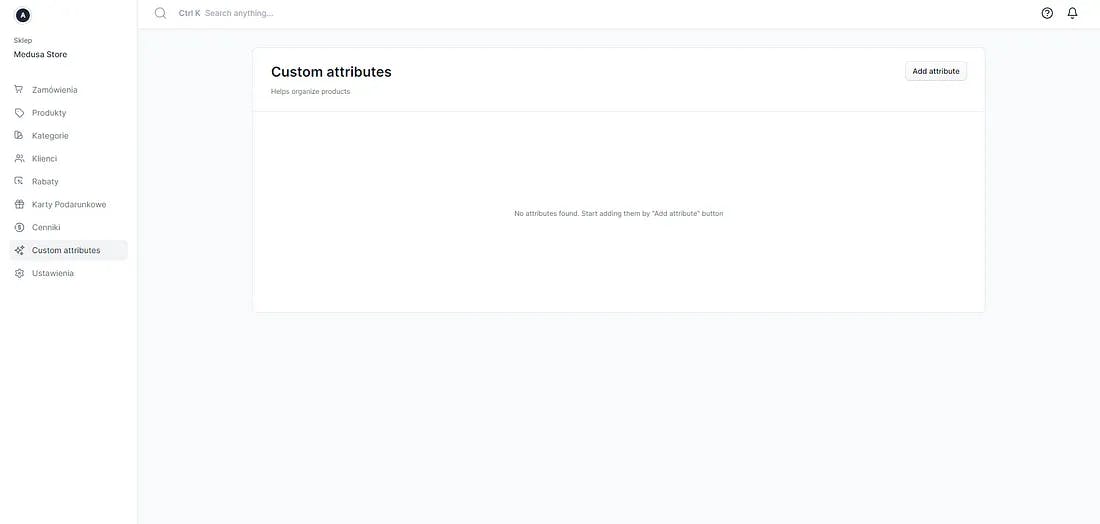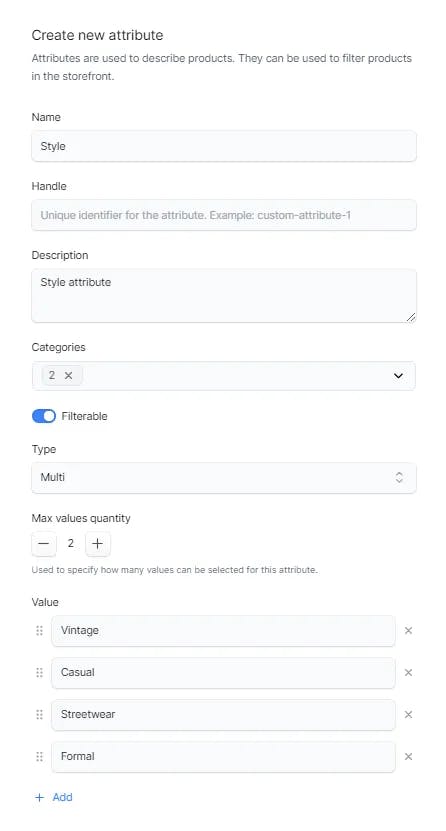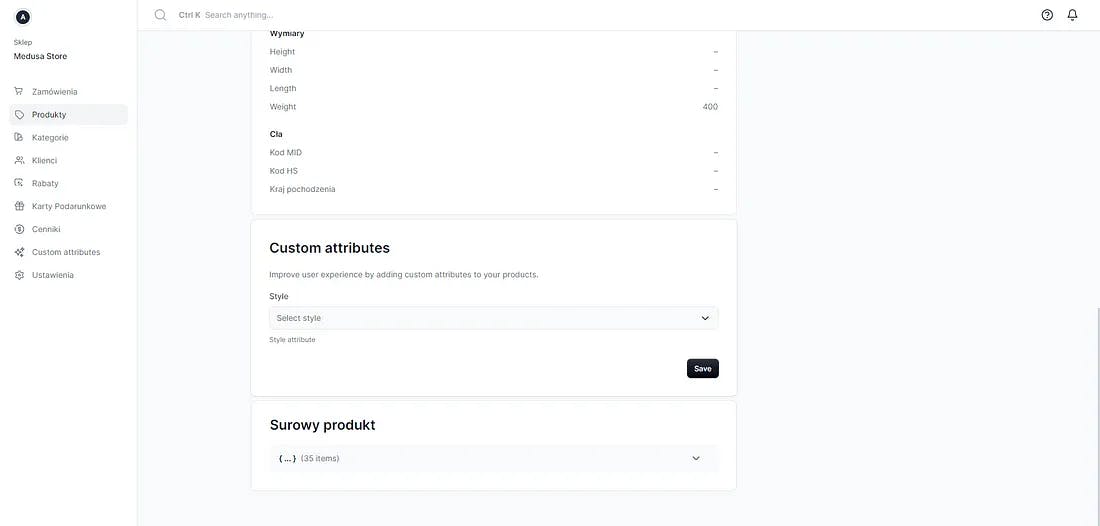Adding Custom Attributes in Medusa.js
By Viktor Holik
By Viktor Holik


In our journey to create custom stores using Medusa.js in Rigby, we encountered a challenge with adding custom attributes to the products.
Medusa.js lacked a built-in custom attribute API, so we used the metadata field with key-value pairs to store our attributes. However, filtering these attributes proved to be a complex task, as they could be of various types, such as arrays, strings, or numbers. We turned to PostgreSQL JSONB queries, but this approach came with its own set of issues.
query.andWhere(
`product.metadata->’attributes’->>’designer’ IN (:…designers)`,
{
designers,
}
);
Challenges with this approach included:
To address these limitations, we developed a new plugin, “medusa-custom-attributes”, which adds a custom attributes API to Medusa.js. Here’s how you can use it:
Install plugin:
npm install medusa-custom-attributes
// OR
yarn add medusa-custom-attributes
If you use product categories, enable them in your .env file:
MEDUSA_FF_PRODUCT_CATEGORIES=true
Next, add the plugin to your medusa-config.js file as follows:
const plugins = [
// ...
{
resolve: `medusa-custom-attributes`,
options: {
enableUI: true,
projectConfig: {
store_cors: STORE_CORS,
admin_cors: ADMIN_CORS,
},
},
},
]
And run migrations:
npx medusa migrations run
After successfully adding the plugin, you can access the “Custom attributes” option in your admin panel.

Click add attribute
medusa-custom-attributes has 3 types of attributes:

After adding an attribute and selecting categories (or leaving the categories field empty for a global attribute), you can select them in the product details page under the “Attributes” widget.

You can list attributes by accessing the /store/attributes route. In the response, attributes with the "filterable" field set to true are filterable. You can also filter attributes by categories using query parameters, like this:
/store/attributes?categories[0]=t-shirts
You’ll receive a response with attribute details and their values.
[
{
"id": "attr_01HE7NV34RT5E9HKGNQG0DJ551",
"created_at": "2023-11-02T09:29:14.642Z",
"updated_at": "2023-11-02T09:29:14.642Z",
"name": "Style",
"description": "Style attribute",
"type": "multi",
"handle": "style",
"filterable": true,
"metadata": null,
"values": [
{
"id": "attr_val_01HE7NV34S6A6MR9ENT7RZF66Q",
"created_at": "2023-11-02T09:29:14.642Z",
"updated_at": "2023-11-02T09:29:14.642Z",
"value": "Vintage",
"metadata": null,
"rank": 0
},
{
"id": "attr_val_01HE7NV34SKH8NBQFCMM48KMDW",
"created_at": "2023-11-02T09:29:14.642Z",
"updated_at": "2023-11-02T09:29:14.642Z",
"value": "Casual",
"metadata": null,
"rank": 1
},
{
"id": "attr_val_01HE7NV34SZMADRN0S70M4ECA7",
"created_at": "2023-11-02T09:29:14.642Z",
"updated_at": "2023-11-02T09:29:14.642Z",
"value": "Streetwear",
"metadata": null,
"rank": 2
},
{
"id": "attr_val_01HE7NV34SZ95MCNYZPTTQVSF3",
"created_at": "2023-11-02T09:29:14.642Z",
"updated_at": "2023-11-02T09:29:14.642Z",
"value": "Formal",
"metadata": null,
"rank": 3
}
],
"categories": [
{
"id": "pcat_pants",
"created_at": "2023-10-22T17:43:13.981Z",
"updated_at": "2023-10-22T17:43:13.981Z",
"name": "Pants",
"description": "",
"handle": "pants",
"is_active": true,
"is_internal": false,
"parent_category_id": null,
"rank": 0
}
]
}
]
To filter products based on attributes, use the attributes_id search parameter:
/store/products?attributes[style][]=attr_val_01HE7NV34S6A6MR9ENT7RZF66Q&attributes[style][]=attr_val_01HE7NV34SKH8NBQFCMM48KMDW
Additionally, product store routes will include attribute_values, which you can use to display attributes in your product listings.
This plugin simplifies the management of custom attributes in Medusa.js, providing a more efficient way to add, filter, and display attributes. You can download the plugin here!
But how to implement maintenance mode in Next.js? Is it as easy as configuring a plugin on WordPress for a few minutes? Of course it is!
Magento, compared to Medusa, may lead to higher long-term costs due to its licensing model and the risk associated with the gradual decline in the popularity of the PHP language...